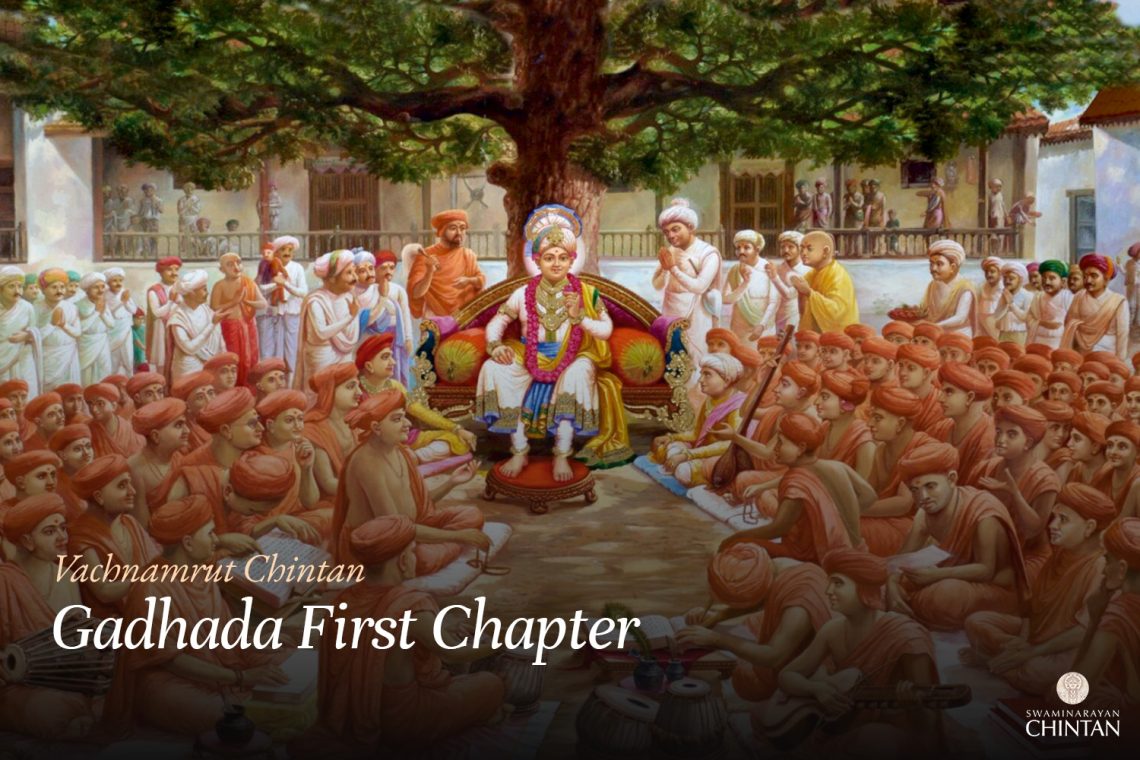Central Insights:
- Devotees of God do not aspire for the 4 types of Mukti
Key Points:
- Do not aspire for anything other than the service of God.
Explanation
In this Vachanamrut, five types of liberation are described in the verses: 1. Salokya 2. Sashti 3. Samipya 4. Sarupya 5. Ekatva. Why then, only four types of salvation are mentioned in Vachanamrut? The answer is that even if one attains the first four types of Salvation, there is still an opportunity for service. In the fifth salvation, “Ekatva” (akin to Kaivalya Mukti), there is no opportunity for service, and hence it is not desired. In such a state, there’s no existence of devotion, and therefore, there’s no possibility of service or even the inclination towards desire or selflessness. Hence, that type of liberation is not sought after. The first four liberations allow for it.
In response, Maharaj says that if there’s no God’s service in that salvation, a devotee does not desire it; they only want to serve. If they desire anything other than service, it’s termed as selfishness. But if they solely desire service, it’s termed as selflessness. Here, ‘service’ means service to God. By serving, Mukti (salvation) is attained because the service to God is so great that it can bestow anything. Through this Mukti, assistance in service is achieved. How can service occur without Samipya or Salokya or Sasthi? Thus, Seva (service) could also be seen as a means to salvation. These two feelings or inclinations exist: if Seva becomes the means, Mukti is achievable. If Mukti becomes the means to Seva, Seva becomes achievable. Which path should a devotee choose? That’s the question?
Shriji Maharaj explains that if there’s an opportunity for Seva, then there’s no aversion towards Mukti. Devotees should take delight in Seva. But should they bear animosity or affection towards Mukti? That’s the question. They don’t desire Salvation, but Maharaj has also explained why: if there’s no Seva in it.
In reality, devotees neither bear animosity nor affection towards Mukti. They utilize Mukti as a privilege in Seva and are therefore termed devotees. When devotees serve God, they become pleased in their heart. God becomes overwhelmed with emotion. Such overwhelming emotion is termed as a blessing. At that moment, God feels an intense urge to bestow something upon the devotee as a reward. In this situation, if a devotee refrains from accepting the material reward, the inner pleasure and contentment of God intensifies even more. Such pleasure is not externally perceptible but is internally realized. The devotee realizes that God is immensely pleased with them. Such a blessing provides eternal bliss. When they decline material rewards, they establish a profound personal connection with God. According to the Upanishads, God claims the devotee as ‘mine’ and subsequently devotes Himself to the service of the devotee. Maharaj says, “I too am a devotee of the devotee, a Sevak.” Such a high state is granted by God only if they decline external rewards. Hence, one should become a selfless devotee and desire nothing but Seva.
Glossary
| Ekatva – Oneness with God (akin to Kaivalya Mukti) |
| Kaivalya Mukti – Liberation from cycle of birth & death Considered undesirable by devotees as it lacks opportunities for devotion and service to God. |
| Bhakti – Devotion or attachment towards God |
| Mukti – Liberation or Salvation The state of being free from the cycle of birth and death, achieving union with the Divine. |
| Samipya – Liberation in close proximity to God |
| Sarupya – Liberation with a divine form similar to God’ |
| Sashti – Liberation with divine powers similar to God’s |
| Selfishness – A state of desiring personal benefits or liberation |
| Seva – Service to God |
| Sevak – A servant of God |
| Upanishads – Ancient Vedic Scriptures Philosophical texts explaining the ultimate truth about God and the soul. |

